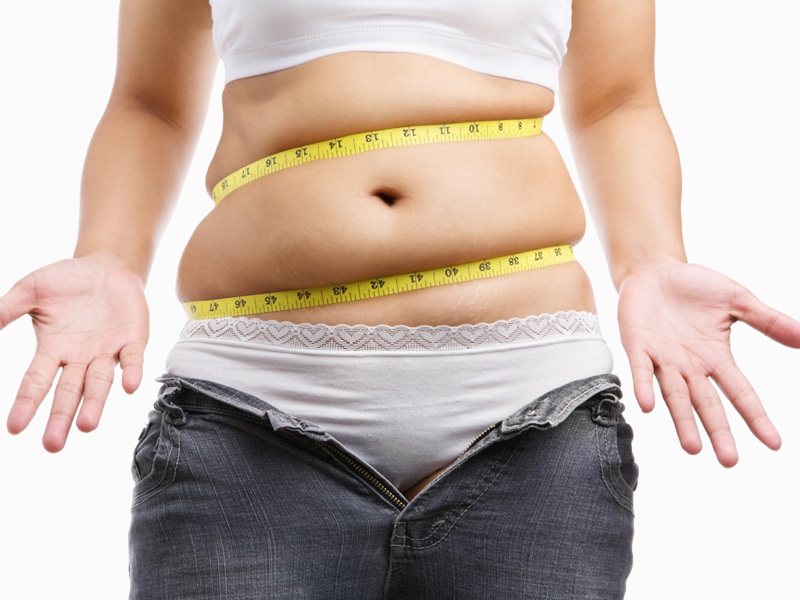It’s the time of the month – when your hormones are in full swing. This weight gain during your period is a reality for a lot of women, and it’s not always easy to deal with. Thankfully, there are some solutions out there that can make dealing with weight gain during your period a little bit easier. In this article, we will explore some of these solutions and how you can apply them to your life. From losing weight to taking birth control supplements, read on to find the solution that works best for you.
Contents
Weight Gain and Periods

Periods are a natural part of being a woman and come with a host of different symptoms, including weight gain. While it is perfectly normal to experience some water retention during this time, many women also gain weight due to hormonal changes that occur in the body during their period.
For starters, progesterone levels tend to increase during your period which can cause an increased appetite and cravings for certain foods. This can lead to overeating and subsequent weight gain throughout your cycle. Additionally, as estrogen levels drop just before your period begins, this can lead to further hunger pangs and cravings for unhealthy snacks or comfort food.
Finally, it’s important to note that hormones don’t just affect your eating habits – they also affect your body’s metabolism. As progesterone increases, it can slow down the rate at which your body burns calories, resulting in weight gain.
What Causes Weight Gain During Periods?
Having your period is a natural part of being a woman, but it can also lead to weight gain. During your menstrual cycle, fluctuations in hormones can cause bloating and water retention that may make you feel like you’ve gained weight. Changes in diet and lifestyle habits could also be to blame for extra pounds during this time of the month.
The detailed description of these causes are:
Hormonal Changes
Hormonal changes are one of the main causes of weight gain during periods. As estrogen levels rise around ovulation, progesterone levels increase after ovulation as your body prepares for a possible pregnancy. If no pregnancy occurs, then there is a decrease in these two hormones. This hormone imbalance can cause some women to experience water retention—which leads to temporary weight gain due to the added fluid in their bodies.
Changes in Diet and Lifestyle Habits
Stress, cravings, and changes in appetite are all common side effects of premenstrual syndrome (PMS). That can lead to overeating or indulging in unhealthy snacks and comfort foods—which can contribute to weight gain during periods. Skipping meals, drinking alcohol, and not getting enough sleep can also affect your body weight.
Medication Changes
Certain medications used to treat PMS or menstrual cramps may cause weight gain as a side effect. Certain birth control methods can also increase appetite levels which could lead to additional pounds over time. Talk with your doctor about any possible changes you could make that would help minimize this side effect. Sometimes, switching to a different medication or birth control method can help.
Retaining Excess Salt and Water
Some women experience bloating during their period due to increased levels of sodium and other electrolytes. This can lead to water retention, making you feel like you’ve put on a few extra pounds. If this is the case for you, cutting back on salty foods and drinking extra water can help reduce the bloat.
Thyroid Problems
One of the less common causes of weight gain during periods is an underlying thyroid issue. If your TSH (thyroid stimulating hormone) levels are higher than normal, it could lead to a slowed metabolism and difficulty losing weight. A doctor can test your thyroid levels and discuss potential treatments.
PCOS
An imbalance in hormones can also lead to polycystic ovarian syndrome (PCOS). This condition is characterized by irregular menstrual cycles, excess hair growth, and difficulty losing weight. If you have been unable to shed extra pounds despite following a healthy diet and exercise routine, it may be time to talk with a healthcare professional about the possibility of PCOS.
Overall, weight gain during periods is usually only temporary and not something to be overly concerned about. Making sure you get enough rest, exercise regularly, and eat a healthy diet are all important for maintaining a healthy weight throughout your menstrual cycle.
How To Prevent Weight Gain During Periods?

There are a few things you can do to try and prevent weight gain during your periods. Some of these are:
Keep a Journal
Keep a food and exercise diary throughout your cycle. Tracking what you’re consuming and how much physical activity you’re doing can help keep you accountable for your health goals, making it easier to identify any possible weight gain triggers. These journals can provide valuable insight into how your body is responding to foods and activities throughout the cycle, allowing you to make informed decisions about what’s best for your health.
Eat Healthy Foods
Focus on eating whole, unprocessed foods as much as possible during your period. Incorporate plenty of fruits, vegetables, lean proteins, and healthy fats into your diet to help keep you feeling energized and satisfied. Avoid foods that are high in sugar, fat, and processed ingredients — these can cause weight gain and other health issues.
Stay Hydrated
Drinking adequate amounts of water is essential for keeping your body functioning properly and preventing dehydration-related weight gain. Aim to drink at least 8 glasses of water each day during your period. This will help flush out toxins from your body, as well as curb any cravings or hunger related to hormonal shifts in the body.
Exercise Regularly
Regular physical activity will not only help you maintain a healthy weight but also reduce stress levels, improve moods, boost energy levels, and increase overall well-being. Try to fit in at least 30 minutes of exercise per day — this could include going for a brisk walk, jogging, or cycling.
Get Enough Sleep
Getting enough sleep is key to managing weight gain during your period. Aim to get at least 7-8 hours of quality sleep each night throughout your cycle. This will help regulate hormones, improve energy levels and reduce cravings. It’s also important to make sure you’re getting adequate rest to prevent fatigue and exhaustion that can lead to increased snacking and overeating.
Consider Supplements
Certain supplements may be beneficial for preventing weight gain during periods. For example, omega-3 fatty acids can help regulate hormones while probiotics can aid digestion and reduce bloating. Talk with your doctor to see if any supplements may be right for you. Some of the supplements that can be beneficial are omega-3 fatty acids, probiotics, and vitamins.
Limit Alcohol Intake
Avoiding or limiting your alcohol intake during your period is important as it can lead to bloating and unwanted calories. Instead, opt for healthier beverages such as green tea which has numerous health benefits. The antioxidants present in green tea may also help reduce bloating and improve digestion.
Take a Multivitamin
Ensure that you are meeting all your nutrient needs by taking a multivitamin while having your period. This will help keep your body healthy and functioning optimally even when the menstrual cycle influences hormones and metabolism. The vitamins and minerals present in the multivitamin can help reduce fatigue, stress, cramps, and other common symptoms associated with periods.
Consult with a Healthcare Professional
If you feel like you need extra help in managing weight gain during your period, it’s best to consult a healthcare professional. They can provide advice on diet and exercise plans tailored to your specific needs, as well as other lifestyle changes that may be beneficial for preventing unwanted weight gain.
Following these simple tips may help you prevent weight gain during your menstrual cycle. Remember to also talk to your doctor about any concerns or health issues related to menstruation. They can provide additional advice on how to maintain a healthy weight that works for your lifestyle.
Conclusion
If you are experiencing weight gain during your period, there might be a few things going on. In this article, we have explored the various reasons behind weight gain during your period. We have also provided you with some tips on how to manage it. By understanding the causes and taking appropriate steps to correct them, you can help prevent excessive weight gain and improve your overall well-being.
Consider contacting FitMantra for additional information on nutrition and fitness. You can also get in touch with their nutrition experts through our online nutrition counseling, who can guide you through the process and help you achieve your fitness goals. You can also lose weight with the help of our weight loss program. Download our Fitness app on Android to learn more about us.
